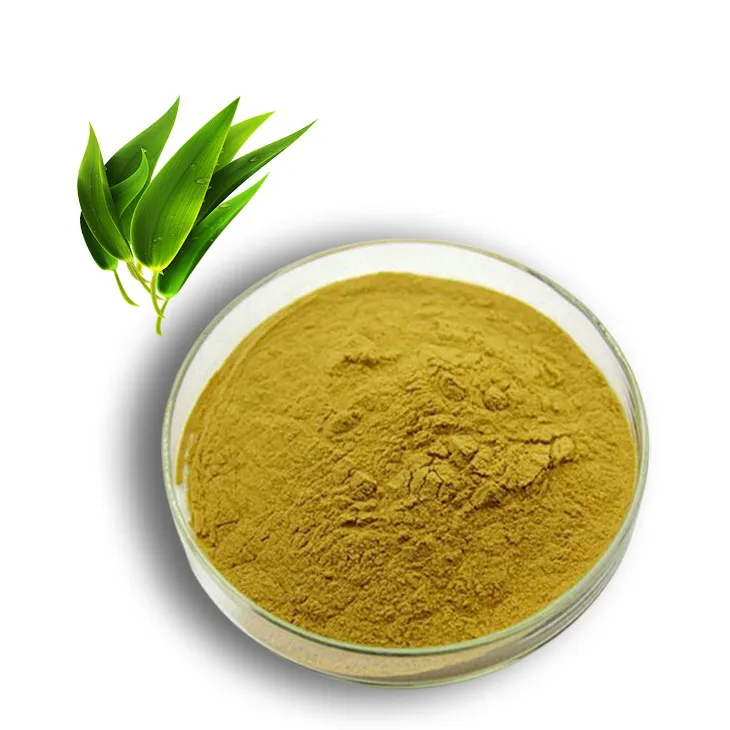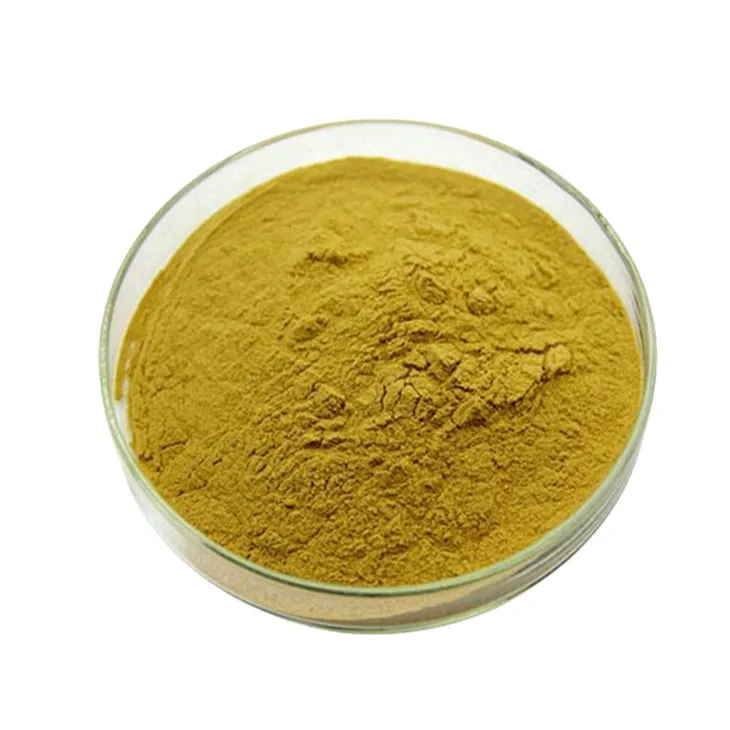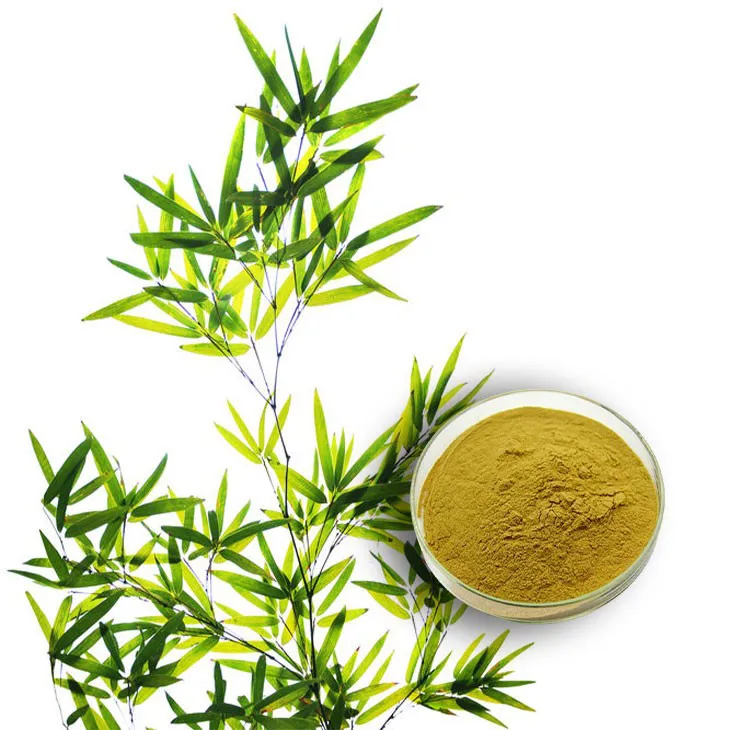- 0086-571-85302990
- sales@greenskybio.com
Understand the Benefits of Bamboo Leaf Extract Supplements.
2024-11-12

Introduction
Bamboo has been an important part of Asian cultures for centuries, not only for its use in construction, handicrafts, and as a food source, but also in traditional medicine. Bamboo Leaf extract supplements are becoming increasingly popular as more people discover their potential health benefits. These extracts are rich in a variety of substances that can have a positive impact on the human body.

The Rich Composition of Bamboo Leaf extract
Bamboo Leaf extracts contain a wide array of beneficial substances. One of the most important groups is phenolic acids, which are powerful antioxidants. These phenolic acids include ferulic acid, p - coumaric acid, and caffeic acid among others. In addition to phenolic acids, bamboo leaf extracts also contain flavonoids, such as orientin and isoorientin. These compounds work together to give bamboo leaf extract its unique properties.

Antioxidant Properties
Protecting Cells from Oxidative Damage
Oxidative stress is a major factor in many chronic diseases and the aging process. Free radicals, which are highly reactive molecules, can damage cells, proteins, and DNA. Antioxidants in bamboo leaf extract, such as phenolic acids, play a crucial role in combating oxidative stress. They neutralize free radicals by donating an electron, thus preventing them from causing damage to cells. This protection can help reduce the risk of various diseases, including heart disease, cancer, and neurodegenerative disorders.
For example, in vitro studies have shown that the phenolic acids in bamboo leaf extract can effectively scavenge free radicals such as superoxide anions and hydroxyl radicals. In vivo studies on animals have also suggested that bamboo leaf extract supplementation can improve antioxidant status, as measured by increased levels of antioxidant enzymes and reduced lipid peroxidation in tissues.

Digestive Health Benefits
Stimulation of Digestive Enzyme Secretion
Bamboo leaf extract is thought to have a positive effect on digestion. It may stimulate the secretion of digestive enzymes, which are essential for breaking down food into smaller molecules that can be absorbed by the body. Digestive enzymes such as amylase, protease, and lipase are involved in the digestion of carbohydrates, proteins, and fats respectively.
Some studies have suggested that certain compounds in bamboo leaf extract can interact with cells in the digestive tract, triggering the release of digestive enzymes. This can lead to improved digestion, reduced symptoms of indigestion such as bloating and abdominal pain, and better absorption of nutrients from food.
Regulation of Gut Microbiota
The gut microbiota plays a crucial role in overall health, influencing digestion, immune function, and even mental health. Bamboo leaf extract may also have an impact on the gut microbiota. Its antimicrobial properties (which will be discussed later) can help to control the growth of harmful bacteria in the gut, while potentially allowing beneficial bacteria to thrive.
Research has shown that a balanced gut microbiota is associated with better digestion, reduced inflammation, and a stronger immune system. By potentially influencing the gut microbiota, bamboo leaf extract could contribute to improved digestive and overall health.

Antimicrobial Properties
Bamboo leaf extract has been found to possess antimicrobial properties. It can help the body resist certain harmful microorganisms, including bacteria, fungi, and viruses. The antimicrobial activity of bamboo leaf extract is attributed to its various bioactive compounds, such as phenolic acids and flavonoids.
For bacteria, in vitro studies have demonstrated that bamboo leaf extract can inhibit the growth of common pathogenic bacteria such as Escherichia coli, Staphylococcus aureus, and Salmonella typhimurium. The mechanism of action may involve disrupting the bacterial cell membrane or interfering with bacterial metabolism.
In the case of fungi, bamboo leaf extract has shown antifungal activity against Candida albicans, a common fungus that can cause infections in humans, especially in immunocompromised individuals. Regarding viruses, while research is still in its early stages, some studies have suggested that certain components of bamboo leaf extract may have antiviral activity against some viruses.
Benefits for Blood Circulation
Some research indicates that bamboo leaf extract might contribute to better blood circulation. This could be due to several factors. Firstly, its antioxidant properties may help protect the blood vessels from oxidative damage. Oxidized lipids in the blood vessels can lead to the formation of plaques, which can narrow the blood vessels and impede blood flow. By reducing oxidative stress, bamboo leaf extract can help maintain the integrity of blood vessels.
Secondly, certain compounds in bamboo leaf extract may have a vasodilatory effect, meaning they can cause the blood vessels to relax and widen. This can lead to improved blood flow, reducing the risk of hypertension and related cardiovascular problems. Additionally, better blood circulation can also ensure that oxygen and nutrients are efficiently delivered to all parts of the body, promoting overall health.
Other Potential Health Benefits
In addition to the above - mentioned benefits, bamboo leaf extract may have other potential health - promoting effects. For example, some preliminary studies have suggested that it may have anti - inflammatory properties. Chronic inflammation is associated with many diseases, including arthritis, diabetes, and heart disease. By reducing inflammation, bamboo leaf extract could potentially play a role in the prevention and management of these conditions.
There is also some evidence to suggest that bamboo leaf extract may have a positive impact on blood sugar regulation. It may help to lower blood glucose levels, which could be beneficial for individuals with diabetes or those at risk of developing diabetes. However, more research is needed to fully understand these potential effects and the mechanisms involved.
Safety and Precautions
While bamboo leaf extract supplements offer potential health benefits, it is important to consider safety and precautions. Generally, bamboo leaf extract is considered safe when taken in appropriate doses. However, as with any supplement, some individuals may experience side effects.
Allergic reactions are possible, especially in individuals who are allergic to bamboo or related plants. Additionally, if taken in excessive doses, it may cause gastrointestinal discomfort such as nausea, vomiting, or diarrhea. Pregnant and breastfeeding women should consult their healthcare providers before taking bamboo leaf extract supplements, as there is limited research on its safety in these populations.
Conclusion
Bamboo leaf extract supplements have a range of potential health benefits. Their antioxidant, digestive - enhancing, antimicrobial, and blood - circulation - improving properties make them an interesting option for those looking to support their overall health. However, more research is needed to fully understand the mechanisms of action and to confirm all of the potential benefits. As with any supplement, it is important to use bamboo leaf extract supplements responsibly and under the guidance of a healthcare professional.
FAQ:
What are the main substances in bamboo leaf extract?
Bamboo leaf extract contains substances such as phenolic acids which are antioxidants.
How does bamboo leaf extract protect cells?
It contains antioxidants like phenolic acids which play a crucial role in protecting cells from oxidative damage.
Can bamboo leaf extract improve digestion?
Yes, it is thought to aid in digestion as it may stimulate the secretion of digestive enzymes.
What is the role of bamboo leaf extract in fighting microorganisms?
Its antimicrobial properties can help the body resist certain harmful microorganisms.
Does bamboo leaf extract have an impact on blood circulation?
Some research indicates that it might contribute to better blood circulation.
Related literature
- Beneficial Effects of Bamboo Leaf Extract: A Review"
- "The Health - Promoting Properties of Bamboo Leaf Extract Supplements"
- ▶ Hesperidin
- ▶ citrus bioflavonoids
- ▶ plant extract
- ▶ lycopene
- ▶ Diosmin
- ▶ Grape seed extract
- ▶ Sea buckthorn Juice Powder
- ▶ Beetroot powder
- ▶ Hops Extract
- ▶ Artichoke Extract
- ▶ Reishi mushroom extract
- ▶ Astaxanthin
- ▶ Green Tea Extract
- ▶ Curcumin Extract
- ▶ Horse Chestnut Extract
- ▶ Other Problems
- ▶ Boswellia Serrata Extract
- ▶ Resveratrol Extract
- ▶ Marigold Extract
- ▶ Grape Leaf Extract
- ▶ blog3
-
Cranberry Plants and Skin - care Products.
2024-11-12
-
Beta Carotene
2024-11-12
-
Echinacea Extract
2024-11-12
-
Wheat Germ Extract
2024-11-12
-
Curcumin
2024-11-12
-
Mulberry Extract
2024-11-12
-
Yellow Pine Extract
2024-11-12
-
Carrageenan Extract Powder
2024-11-12
-
Lemon Juice Powder
2024-11-12
-
Hawthorn powder
2024-11-12
-
Mango flavored powder
2024-11-12





















